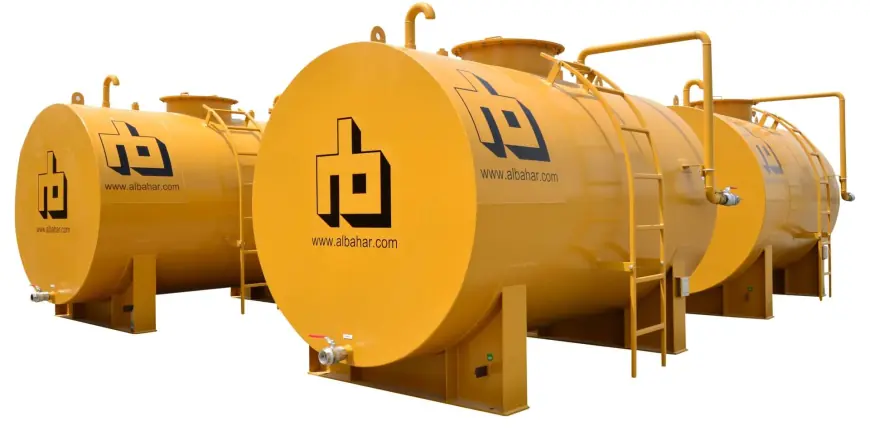Fuel Storage Tanks: The Complete Guide to 1000-Gallon Tanks
Comprehensive Guide to 1000-Gallon Fuel Storage Tanks: Types, Benefits, Installation, Maintenance, and Compliance.

Introduction to Fuel Storage Tanks
What Are Fuel Storage Tanks?
Fuel storage tanks 1000 gallons are specialized containers designed to safely store fuels like diesel, gasoline, and other flammable liquids. These tanks are essential in various industries, ensuring an uninterrupted fuel supply for machinery, vehicles, and equipment.
Importance of Proper Fuel Storage
Improper fuel storage can lead to contamination, leaks, or environmental hazards. Using the right tank ensures safety, compliance, and long-term fuel quality.
Overview of 1000-Gallon Fuel Storage Tanks
Why Choose a 1000-gallon Capacity?
A 1000-gallon tank strikes the perfect balance between capacity and practicality. It's large enough for substantial fuel storage yet compact enough for easy installation in different settings.
Industries and Applications
These tanks are widely used in agriculture, transportation, construction, and emergency backup systems. Their versatility makes them an asset for businesses of all sizes.
Types of 1000-Gallon Fuel Storage Tanks
Above-Ground vs. Underground Tanks
- Above-Ground Tanks: Easier to install, monitor, and maintain.
- Underground Tanks: Space-saving and better for aesthetic considerations.
Single-Wall vs. Double-Wall Tanks
- Single-Wall Tanks: Cost-effective but require additional safety measures.
- Double-Wall Tanks: Provide an extra layer of protection against leaks.
Key Materials Used in Fuel Storage Tanks
Steel Tanks
Highly durable and resistant to physical damage, steel is a popular choice for industrial applications.
Fiberglass Tanks
Lightweight and corrosion-resistant, these tanks are ideal for long-term storage in challenging environments.
Polyethylene Tanks
Affordable and easy to transport, polyethene tanks are suitable for smaller-scale operations.
Design Features of 1000-Gallon Fuel Storage Tanks
- Venting Systems: Prevent pressure buildup.
- Leak Detection Systems: Ensure early detection of any issues.
- Corrosion Resistance: Enhances longevity and safety.
Benefits of 1000-Gallon Fuel Storage Tanks
- Versatility: Suitable for multiple industries.
- Cost-Effectiveness: Offers value for its capacity.
- Space Efficiency: Compact design fits various locations.
Regulations and Compliance for Fuel Storage
Fuel storage tanks must comply with environmental and safety standards, such as EPA guidelines and fire codes. Proper documentation and certifications are critical.
Installation of 1000-gallon Fuel Storage Tanks
Site Preparation
Choose a stable, leveled area, away from potential hazards.
Professional Installation Guidelines
Hiring certified professionals ensures proper setup and compliance with regulations.
Maintenance and Care for Fuel Storage Tanks
Routine inspections, cleaning, and timely repairs are necessary to maintain efficiency and safety.
Cost Factors for 1000-Gallon Fuel Storage Tanks
Initial costs depend on the material and design, while long-term expenses include maintenance, inspections, and potential upgrades.
Fuel Storage Tank Accessories
Accessories like pumps, hoses, and monitoring systems enhance functionality and safety.
Top Manufacturers of 1000-gallon Fuel Storage Tanks
Leading brands like Highland Tank, Snyder Industries, and Containment Solutions offer reliable and durable options.
Common Challenges and Solutions
Addressing Leaks
Use double-walled tanks and regularly inspect for cracks.
Preventing Contamination
Invest in high-quality filters and proper sealing mechanisms.
Sustainability and Future Trends
Eco-friendly tanks and advancements in monitoring technology are shaping the future of fuel storage solutions.
Read Also: Enhancing Comfort and Efficiency: The Role of Acoustic Enclosures for Air Conditioners
Conclusion
A 1000-gallon fuel storage tank is a practical solution for various industries. Its versatility, cost-effectiveness, and safety features make it an essential asset for businesses and individuals alike.
FAQs: Frequently Asked Question
Q. What is the lifespan of a 1000-gallon fuel storage tank?
Ans. Most tanks last 15–20 years with proper maintenance.
Q. Can these tanks store other liquids?
Ans. Yes, but ensure compatibility with the tank material.
Q. How do I choose the right tank for my needs?
Ans. Consider your fuel type, capacity needs, and environmental conditions.
Q. Are there specific regulations for portable fuel tanks?
Ans. Yes, portable tanks must meet DOT and EPA guidelines.
Q. How often should a fuel storage tank be inspected?
Ans. Inspections are recommended annually or more frequently for high-usage tanks.












